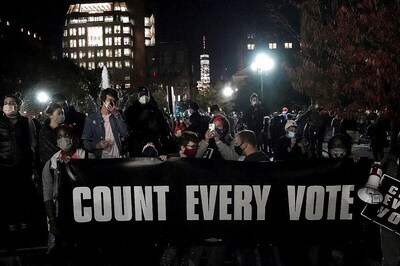
views
Honolulu: President Barack Obama told China on Sunday that the United States was fed up with its trade and currency practices, as he turned up the heat on America's biggest economic rival at an Asia Pacific summit.
"Enough's enough," Obama said bluntly at a closing news conference at the annual Asia-Pacific Economic Cooperation meeting where he scored a significant breakthrough in his push to create a pan-Pacific free trade zone.
Using some of his toughest language yet against China, Obama - a day after face-to-face talks with President Hu Jintao - demanded that China stop 'gaming' the international economic system and create a level playing field for US and other foreign businesses.
"We're going to continue to be firm that China operate by the same rules as everyone else," Obama said. "We don't want them taking advantage of the United States."
There was no immediate response from China, which has in the past shrugged off US demands that it allow its currency to float freely and take steps to reduce its huge trade surplus.
And it was unclear how much of Obama's tough rhetoric was, at least in part, political posturing aimed at economically weary US voters who will decide next November whether to give him a second term.
Obama insisted that China must let its currency rise faster in value, saying it was being kept artificially low and was thus hurting American companies and jobs. He said China, which often presents itself as a developing country, is now 'grown up' and should act that way in global economic affairs.
Obama's remarks came as Asia-Pacific leaders sought to present a unified front, with a pledge to bolster their economies and lower trade barriers in an effort to shield against the fallout from Europe's debt crisis.
The 21 members of APEC - which accounts for more than half of the world's economic output - said they had agreed on ways to counter "significant downside risks" to the world economy.
That followed an appeal by Obama, seeking to reassert US leadership to counter China's expanding influence around the Pacific Rim, for a commitment to expand trade opportunities as an antidote to Europe's fiscal woes.
It is a "time of uncertainty" for the global economy, the summit's final communique said, with growth and job creation weakened not only by the euro zone crisis but by natural disasters like Japan's devastating earthquake and tsunami.
"We recognize that further trade liberalization is essential to achieving a sustainable global recovery in the aftermath of the global recession of 2008-2009," the leaders said after talks in Honolulu.
The communique expressed a firm resolve "to support the strong, sustained and balanced growth of the regional and global economy" - a clear reference to US concerns about a huge trade deficit with China's export-driven economy.
In another bow to US pressure, APEC committed, albeit in somewhat vague terms, to reducing tariffs on environmental goods and services, even though China had resisted the idea. APEC also committed to support clean energy.
Differences persist over currencies and trade - a point hammered home by US-China tensions at the summit - and the question remains how far leaders will be able to go in turning promises into action when they return home.
Many, Obama included, will face resistance to opening markets further to foreign competition.

















Comments
0 comment